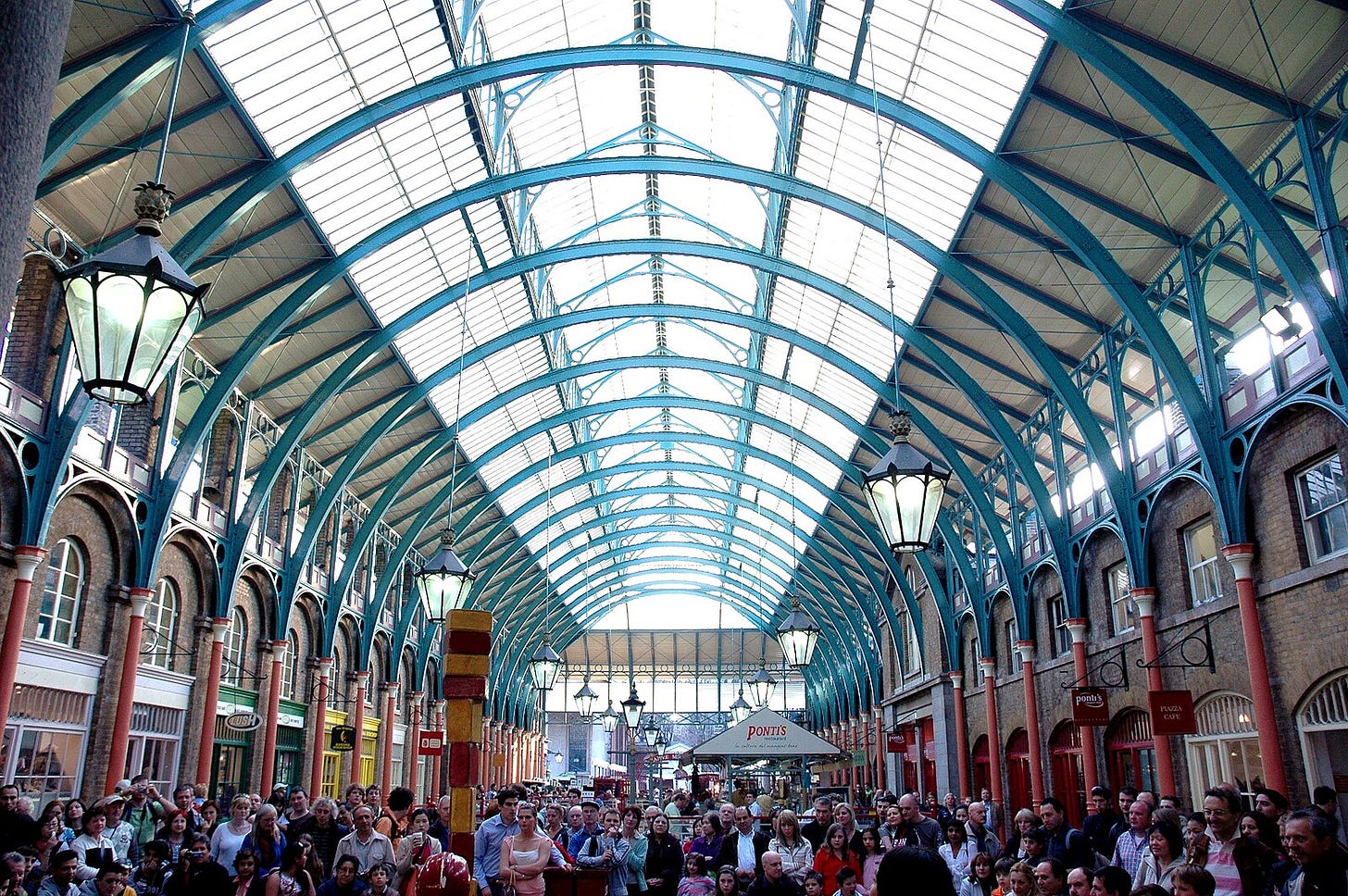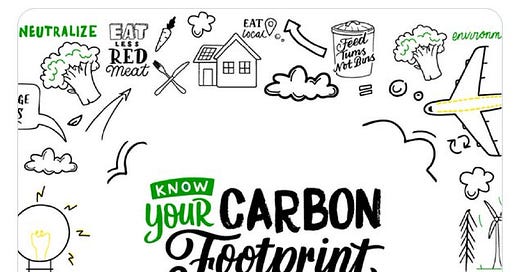

Discover more from Oxymoron
In my explorations of “sustainable business”, I'm often wondering what these two words really mean. I've previously shared some ponderings about the meaning of the word “sustainability”, but what about the word business?
It turns out that it is exactly what it sounds like. The word business originates from Northumbria where the old English word “bisignes” meant care, anxiety or occupation. This evolved into “busyness”, meaning a state of being occupied or engaged. In other words, a state of being busy.
This puts a whole new perspective on the term sustainable business and makes it feel like even more of an oxymoron. If sustainability is the ability to sustain something over the long term, then sustainable business would be to stay busy indefinitely.
Is that viable?
And more importantly, is that what we really want?
I was wandering the streets of Covent Garden in London last week and I was amazed by the busyness of it all. When I pulled myself out of my own busyness to stop and observe it, I saw it as quite a sight to behold. So many people scurrying about in a hive of activity; rushing this way and that to get to the next shop, to grab a coffee, to catch a bus or to get to their next meeting on time. Taxi drivers rushing to get their passengers to their destinations, Uber Eats riders darting about to deliver lunch to people who are so busy that they can't even stop to feed themselves, and delivery vans rushing to drop off parcels within the hurried timeslots dictated by their computerised overlords.
The only person not in a hurry was the homeless guy sitting on the pavement outside Tesco Express, who seemed strangely relaxed amid the frenzy of activity around him.
There’s nothing wrong with being busy some of the time, and a place like Covent Garden can seem exciting precisely because it is so busy, but it's also tiring if you stay too long. It's a concentrated microcosm of our modern society that moves at an unnaturally fast pace without taking a break.
So much to do, so little time
I think it's fair to say that most of us live busy lives and feel that the world seems to be speeding up. I’m sure that part of this is just the experience of getting older and having more responsibilities, but there are also reasons why we might actually be getting busier.
The most obvious reason is the cultural belief that our economy needs to keep growing at all costs. We've been brainwashed to believe that if an economy isn’t growing then it is in a “recession” - a word that we are led to believe is a synonym for doom. It’s as if there is a deadly spirit called ‘Recession’, constantly nipping at our heels. We must keep running as fast as possible to avoid getting caught.
To be fair, most of us don’t feel that it’s our personal responsibility to boost the country's GDP figures, but we do carry around a subconscious fear that there might not be enough and that we must keep running to stay ahead of the pack. We live with the fear of scarcity programmed into our sub-conscious minds, effecting how we live and how we run our companies.
This fear of scarcity doesn't really make any sense for most of us in terms of essential resources like food and water, but it does make sense in terms of money. As I've written before, our monetary system is rigged to be inherently inflationary, constantly syphoning money out of the pockets of normal people so that we have to keep earning more. In other words, we have to constantly keep ourselves busy trying to earn more and more of the tokens that we call money because the value of our existing tokens is always reducing. Despite the constant march of technological progress making production more efficient, life is paradoxically always becoming more expensive. £100 in 1924 was worth the equivalent of £7619 today, meaning that money has lost nearly all of it’s value in just 100 years and every generation seems to be busier than the last just trying to keep up.
Think about that; technology should have made it possible to meet our physical needs and wants with minimal effort and yet every generation seems to be busier than the last. Is the monetary system speeding us up faster than new technology can slow us down?
Well, as much as the monetary system has an effect, the advancement of technology has a habit of being more of an accelerant than a decelerant. That is after all, why financiers love tech. I was at an AI conference recently in which speakers were promoting the idea that AI tools will free up our time and allow us to slow down, relax and go for a walk in the middle of the day. While this sounds wonderful, the reality is that before we know it, this new technology will have shifted perspectives to the point that employers and customers expect the same work done in a fraction of the time. That walk in the park will be out of the window and we will be busier than ever. As I wrote in my article about the Jevons paradox, technology is an accelerator of human activity that drives a cycle of ever more consumption and busyness.
And so we have the accelerating forces of the monetary system and technology, but we are also complicit in our own busyness. We want to enjoy all of the things that modern life has to offer and to keep up with the Jones’s. We live with the fear of missing out and constantly readjust our expectations to align with what the people around us have and what the constant stream of advertising is telling us we should want.
And to top it all off, we get stuck in the spiral of the Diderot effect, named after the French philosopher Denis Diderot who in his essay ‘Regrets on Parting with My Old Dressing Gown’, tells the story of how after obtaining a new robe, he found that it made his other clothes look rather old and dowdy, so he had to upgrade his wardrobe, only to find that he then felt out of place in his own home and had to buy new furniture and decorations. He famously said;
I was absolute master of my old dressing gown, but I have become a slave to my new one.
And so we all become slaves to our own ever increasing expectations, pushing on the accelerator of our own lives.
Is it possible to slow down?
The simple truth is that while we are all somewhat trapped by the forces of the modern economic system, we do have some control over our individual and collective destiny. It’s just hard to see from where we are standing.
In challenging our modern assumptions, it’s helpful to look back at whether a more sustainable, less busy economy has ever existed. According to anthropologist Marshall Sahlins, it did.
In 1972 he published the book Stone Age Economics in which he proposed that our modern culture has greatly misunderstood indigenous cultures and early human societies. He highlighted we are prejudiced to see these societies as poor because we measure wealth in money and not in time and wellbeing. Turning this on it’s head, he described these cultures as “the original affluent society” who worked just 15-20 hours per week to meet their needs and wants, with the rest of their time free to talk, dance, sing, make arts and crafts, and ponder the mysteries of life.
He contrasts our modern culture with those of the past, stating that our wants are now infinite, whereas they were previously finite. He theorised that the objective of “work” is simply to meet our needs and wants - the means to the end. The amount of work we must do therefore, is defined by the size of the gap between what we have, and what we need and want. To close this gap, we have two choices; we can either increase industrial productivity to fulfil more of our needs and wants, or we can take the “Zen road to affluence” and reduce our wants.
On this somewhat paradoxical alternative path…
human material wants are finite and few.... Adopting the Zen strategy, a people can enjoy an unparalleled material plenty with a low standard of living.
In a world of infinite wants, we will always have to keep running faster as we chase the end of the rainbow. Therefore, only when we shift our culture to one of finite wants can we finally close the gap and use our technology to help us slow down.
Of course, these early cultures had their fair share of problems, such as high infant mortality and tribal warfare, but they also had adult life expectancy similar to western societies today, lots of free time, close knit communities and true sustainability within their natural environments. I’m not suggesting that we should go back to that, but when forming visions for the future that we want to create, we would serve ourselves well to remember that much of what we want is not fundamentally difficult to achieve.
The power of words
All of this is a very long winded way of saying that busyness is fundamentally part of the problem to our current environmental crisis. Business is after all, humans being busy with far more commercial activity than the planet can absorb. This is great for the economy because we measure the success of a country’s economy as Gross Domestic Product (GDP), which is essentially a measure of the amount of commercial activity, or busyness, that takes place in a given year. We don’t notice that anything is out of place because GDP and busyness are very much speaking the same language.
But things are out of place. Our modern societies are consuming record levels of human and planetary resources while eroding physical and mental health, community spirit and our natural ecosystems. We might have the latest iPhone, but when it comes to the things that matter most, we are constantly getting less for more.
We need to change our thinking and to do this, we might need to change our words. Words have more power than we give them credit for. The way we describe something can affect the way we perceive it and influence our behaviour. We create the things that we imagine, and we optimise for what we measure. If we describe most human organisations as businesses and we measure success with a metric of busyiness like turnover, GDP or even our salaries, is it any wonder that us humans become ever more busy?
I recently wrote in an article about whether AI will eliminate business, that;
In the mid 2000s I was frustrated by the narrative in the environmental movement that business was the problem. In many ways, I agree that businesses were and are part of the problem, but I found the narrative unhelpful. It pointed fingers at a problem without offering a tangible solution. What did the environmentalists want us to do? Abolish business?
Now I’m looking back on that statement and wondering whether the answer is in the question in a simpler form than I had ever imagined. Perhaps what we need to do isn’t to abolish business in terms of abolishing organisations or trade, but abolish use of the word “business” as the main way of describing what it is we all do every day.
Maybe sustainable business seems difficult precisely because it is an oxymoron. What if we reframed our ambitions and perspectives in a way that challenged the narrative of being constantly busy?
We might adapt to talking about sustainable companies, organisations, communities, careers or lifestyles. We might describe what we do through impact models and service models instead of business models. We might no longer make business plans and instead make progress plans or achievement plans, defining success by the difference we make in the world rather than the amount of activity generated. We might even finally make the shift to thinking of our organisations and their role in society as systems.
One little shift in our language could cascade down into new uses of language and new ways of thinking about why our organisations exist, what they are here to do and how they go about doing it. Who knows, we might even end up exploring Marshall Sahlins’ “Zen strategy” and shifting our culture to one of finite rather than infinite wants.
I know that I’m going to end up being a hypocrite here and using the term business in future content, but I think it’s interesting to ponder the power of language in shaping our world so that we can try to pick words that better reflect the future we want to create.
On that note, I’m going to be taking some time away from the busyness of writing for a little while. For the first time in more than a decade I have the opportunity to slow down and take a bit of time away from the computer and so I am going to grab it with both hands. Thanks for reading, please do leave a comment or share it on LinkedIn, and I’ll see you when the flowers blossom in the spring.


















There's so much to love about this piece, thank you for writing it. Language creates our reality. If we want to change the world, we need to change the way we see, describe and talk about the world and our place in it. Also, it's so true that the phrase "sustainable business" is an oxymoron. I'm currently reflecting on how we can support organisations making the shift from an extractive model (i.e. human resources, toxic productivity serving relentless growth, harmful "move fast and break things" practices) to a more sustainable, even regenerative cultural ideal. Also, as an anthropology graduate, it's a delight to see "Stone Age Economics" referenced here!
Thank you Tom, this is fantastic!